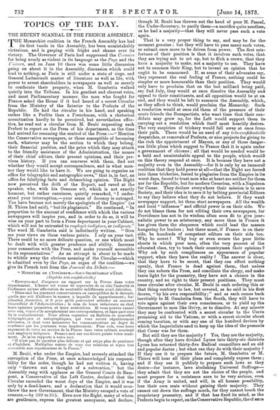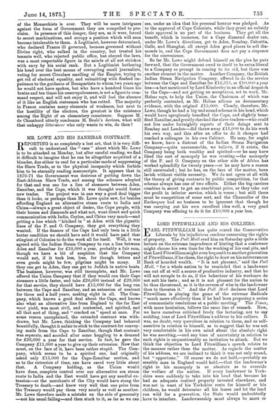TOPICS OF THE DAY.
THE RECENT SCANDAL IN THE FRENCH ASSEMBLY.
rrHE Monarchist coalition in the French Assembly has had its first tussle in the Assembly, has been unmistakably victorious, and is gasping with fright and shame over its victory. The Governor of Paris had suppressed the Corsaire for being nearly as violent in its language as the Pays and the Univers, and on June 10 there was some little discussion going on about it in the Assembly, discussion which could lead to nothing, as Paris is still under a state of siege, and General Ladmirault master of literature as well as life, with power to arrest shareholders in newspapers as well as merely to confiscate their property, when M. Gambetta walked quietly into the Tribune. In his gentlest and clearest voice, and most Parliamentary manner, the man who fought for France asked the House if it had heard of a secret Circular from the Ministry of the Interior to the Prefects of the Republic. He had the circular in his hand, and speaking rather like a Peelite than a Frenchman, with a rhetorical accentuation hardly to be perceived, but nevertheless effec- tive, he read out a circular from M. Beule requesting each Prefect to report on the Press of his department, as the time had arrived for resuming the control of the Press :—" Mention the Conservative newspapers, or those susceptible of becoming such, whatever may be the section to which they belong, their financial position, and the price which they may attach to the friendly assistance of the Administration, the names of their chief editors, their present opinions, and their pre- vious history. If you can converse with them, find out whether they would accept correspondence, and in what man- ner they would like to have it. We are going to organise an office for telegraphic and autographic news," that is, in fact, an office for falsifying facts and debauching opinion. The Right now perceived the drift of the Report, and raved at the speaker, who, with his Genoese wit, which is not exactly humour, but rather canniness, quietly remarked, "I under- stand your interruption,—your sense of decency is outraged. You have become not merely the apologists of the Empire" (as M. Thiers had said), "but its plagiarists." He continued, "In proportion to the amount of confidence with which the various newspapers will inspire you, and in order to do so, it will be wise on your part to form a Press department in your Cabinet, which will not be entrusted to employe's indiOnes, or indigents." The word M. Gambetta said is indistinctly written. "Give me your views on these various points. I rely on your tact. There could be no more delicate question, or one which must be dealt with with greater prudence and ability. Increase your connection with the Press, and make yourself accessible to its representatives." As an attempt is about to be made to whittle away the obvious meaning of the Circular—which is admitted even by the Pays, an organ of the coalition—we give its French text from the Journal des Debuts :— " MINISTER& DE LINTI:RIEUR.—SOUS-SECRETARIAT AT&T.
(Depeche fres eoufidentielle) " Envoyez-moi d'urgence un rapport sur la Presse dans votre clepartement. L'heure est venue de reprendre de ce cote l'autorite et l'inflnence qu'une affectation de neutralite indifferente avait detruites.
Dites-moi lee journaux conservateurs on snsceptibles de le devenir, quelle quo soit d'ailleurs la nuance it laquelle ils appartiennent ; lour situation financiere, et le prix qu'ils pourraient attacher au eoncours bienveillant de l'Administration ; le nom de lours redacteurs en chef, leurs opinions premieres, et leurs antecedens. Si TORS pouvez causer area eux, voyez s'ils accepteraient une correspondance, et dans quel seas Hs la souhaiteraient. None aliens organiser un Bulletin de nouvelles telegraphiques et autographiques, qui vous seront regulierement adressees, et dent TOus mesurerez les communications an degre de confiance que lee journaux vous inspireraient. Pour cola, vous ferez sagement de creer un service de la Presse dans votre cabinet, soustrait aux employes indigenes. Donnez-moi sur ces divers points votre senti- ment. Jo m'en rapporte itvotre tact.
"Ii n'est pas de question plus delicate et qui exige plus de prudence et d'habilete. Multipliez antour de YOUS roe relations et soyez tres accessible aux representans de la Presse."
M. Beule, who under the Empire, had severely attacked the corruption of the Press, at once acknowledged his responsi- bility for the order, though he had not written it, having only "thrown out a thought of a subvention," but the Assembly rang with applause as the General Comte de Ram- pont, a Conservative of the Left Centre, declared that the Circular exceeded the worst days of the Empire, and it was only by a dead-heave, and a declaration that it would over- throw the new Government, that the Ministry escaped a vote of censure,—by 389 to 315. Even now the Right, many of whom are gentlemen, express the greatest annoyance, and declare, though M. Beule has thrown out the head of poor M. Pascal,. the Under-Secretary, to pacify them—a sacrifice quite needless;. as he had a majority—that they will never pass such a vote again.
That is a very proper thing to say, and may be for the moment genuine ; but they will have to pass many such votes, or submit once more to be driven from power. The first mis- fortune of their position is that it involves such votes, that they are trying not to set up, but to filch a crown, that they have a majority to make, not a majority to use. They have not to summon their King, but to invent an opinion that he- ought to be summoned. If, as some of their advocates say,. they represent the real feeling of France, nothing could be simpler or more honourable than their position. They would only have to proclaim that on the last milliard being paid, say 2nd July, they would at once dissolve the Assembly and appeal to their constituents, and all opposition would be at an end, and they would be left to summon the Assembly, which, as they affect to think, would proclaim the Monarchy. Such a resolution would at once rid them of the pressure of their acute friends the Bonapartists, who want time that their can- didate may grow up, for the Left would support them in carrying out a resolution which itself most heartily desires. The very suspicion of trickery would fall away at once from) their path. There would be no need of any tres-confidentielte. despatches, or removals of Prefects, or nice projects for giving to the rich the appointment of Mayors, or any of those danger- ous little plans which suggest to France that it is again under a government of chicane ; all that would be needed would be- a bold and unmistakable appeal to the people, which would on this theory respond at once. It is because they have not a majority even in the Assembly—for it is only by an immoral coalition that they hold power at all—that the Right are forced' into these trickeries, forced to plagiarise from the Empire in its worst days, forced to trust men who at heart are neither for them, nor for the Republic, but for modern Cwsarism, with a Napoleon for Cwsar. They declare everywhere their mission is to save. Society, and their idea is to save it by bribing provincial Editors. to say they believe what they do not believe. If they want newspaper support, let them start newspapers. All the wealth, and local " influence " and official power is on their side. We do not blame them for not editing their own newspapers, for Providence has not in its wisdom often seen fit to give jour- nalistic power to an aristocracy, any more than in France it has given them the eloquence which could lead the masses. hungering for leaders ; but there must, if France is on their side, be hundreds of competent editors on their side too. Why be secret ? Why buy or even secure the poor little sheets in which poor men, often the very poorest of the educated class, try to teach their countrymen their opinions ?'. Why ask by such compliances an appearance of popular support, when they have the reality ? The answer is clear, that they have to be secret, that they can effect nothing openly, that France is dead against them, that unless they can suborn the Press, and conciliate the clergy, and make taxes light for the peasantry, they have not a chance in the country, and no right to their present positions. They must issue circular after circular, M. Beule in each ordering this or that thing contrary to law, but covered, as he said in his first decree, "by his own responsibility ;" and as each comes back inevitably to M. Gambetta from the South, they will have to vote again against their own consciences, or to yield up the Government to men like Grevy, or to dissolve. At any minute they may be confronted with a secret circular to the Cures. promising aid to the Vatican, or with a secret circular about coming taxation, or with any one of the hundred devices by which the Imperialists used to keep up the idea of the peasants that Csar was for them.
But still they are the majority ? Yes, they are the majority, though after they have divided Lyons into thirty-six districts Lyons has returned thirty-five Radical councilors and an old and popular doctor ; but what can they do with their majority ? If they use it to prepare the future, M. Gambetta or M. niers will hear all their plans and completely expose them ;
and if they use it publicly to prepare such laws as they desire—for instance, laws abolishing Universal Suffrage—
they admit that they are not the choice of the people, and must prepare for a resistance sure to be very serious, even if the Army is united, and will, in all human possibility, lose their own seats without gaining their majority. They cannot cut down the suffrage much, for they cannot touch the proprietary peasantry, and if that has fixed its mind, as the Prefects begin to report, on the Conservative Republic, the el ] awe
of the Monarchists is over. They will be mere intriguers against the form of Government they are compelled to pro- claim. In presence of this danger, they are, as it were, forced to secret machinations, and occupy a position which will soon become intolerable to them. A Legitimist, however determined, who declared France ill governed, because governed without Divine right, who sulked in the country, but treated his tenants well, who rejected public office, but obeyed the laws, was a most respectable figure in the minds of all not stricken with envy by his social rank. But a Legitimist bothering his head over the best means of corrupting small journalists, voting for secret Circulars smelling of the Empire, trying to get rid of electoral equality, and submitting with flushed im- patience to the guidance of Bonapartists to whom two years ago he would not have spoken, but who have a hundred times his brains and ten times his unscrupulousness, is not a figure to com- mand respect, and will not enjoy it, and will feel the absence of it like an English statesman who has ratted. The majority in France contains many elements of weakness, but next to the hostility of the electors, the greatest is the existence among the Right of an elementary conscience. Suppose M. de Chambord utterly condemns M. Beale's devices, what will that unhappy litterateur who only wants to win, do then ?



































 Previous page
Previous page